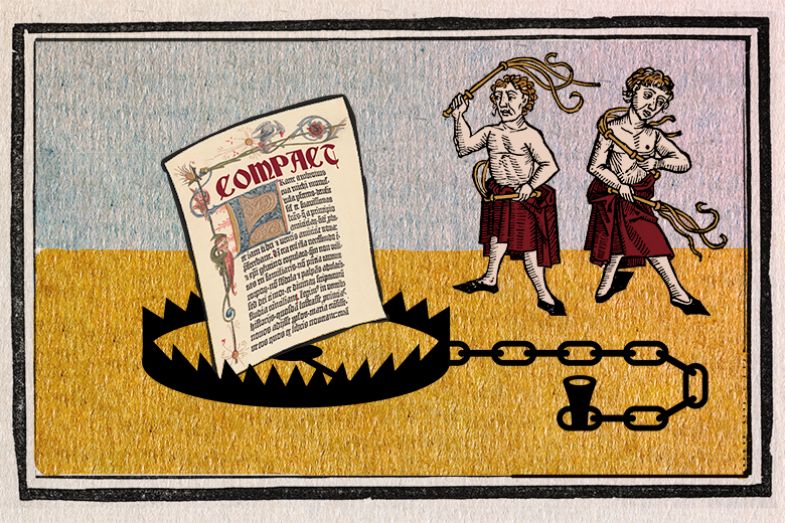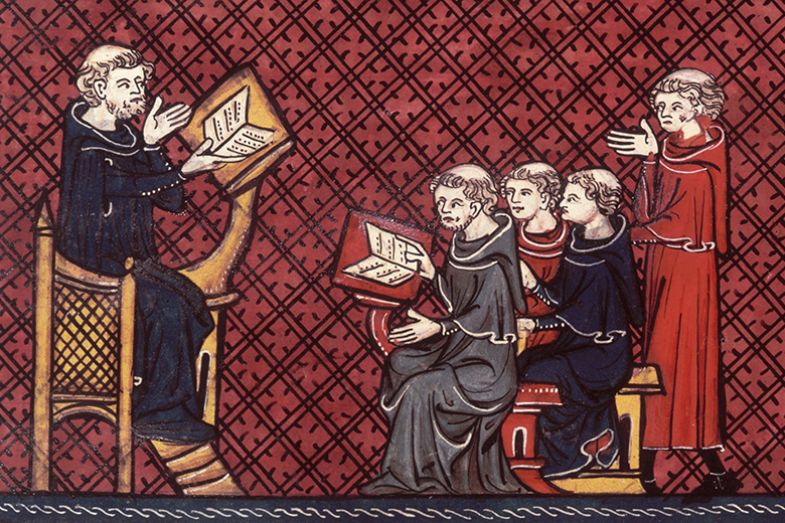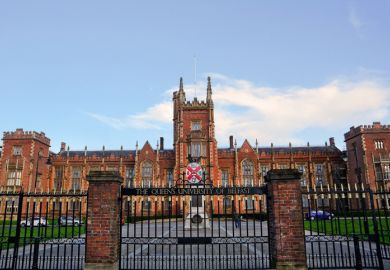The first and most obvious thing to say about the Trump administration’s Compact for Academic Excellence is that it won’t hold up in court.
The document, published earlier this month, professes an aim to ensure that American universities “carry values that will uplift Western civilisation and our country” and to help the next generation “grow into resilient, curious and moral leaders, inspired by American and Western values”.
How? By offering all American universities (increased this week from an original nine) preferential treatment in federal funding in exchange for submitting to government demands in two main areas. One is admission and hiring procedures – including banning consideration of race or sex and limiting the number of admitted international students. The other is free speech. The universities must maintain institutional neutrality and ensure a “vibrant marketplace of ideas on campus”, while employees will be forbidden from expressing political views on behalf of the institution and departments that “punish, belittle” or “spark violence against conservative ideas” will be shut down. Anonymous polling of students and employees on compact compliance will be published to keep the universities in line. If officials in the Department of Justice (DOJ) decide that universities are non-compliant, they can unilaterally enforce funding cuts and require repayment of previously granted federal and private funds.
Most of this is flagrantly unconstitutional. It usurps Congress’ spending power, coercively conditions federal funds, imposes unconstitutional limits on free speech, engages in viewpoint discrimination, rests on unconstitutionally vague terms and mandates gender policies that amount to unlawful discrimination. A threat dressed up as an invitation, the compact is clearly a trap: those who sign will surrender almost all of their academic freedom in exchange for no additional benefit beyond what current law and policy already protect.
The trouble with a purely legal analysis, though, is that the compact isn’t playing the game of legality. It’s playing the game of legitimacy: its wager is that extralegal coercion can and will be rationalised by supporters as a means to the end of restoring accountability to higher education and ensuring that universities serve the taxpayers who fund them. And it is probably right: they’ll say that the executive branch, elected by a majority of voters, has earned a democratic mandate to make long-overdue policy changes to institutions with which polls consistently indicate that Americans are unhappy.
As for the universities that don’t join the compact or professional associations that sue to block it, they will be condemned by the compact’s cheerleaders as defiant elites undemocratically trying to dodge majority rule, resist transparency and retain the right to belittle conservatives and put their own autonomy and ideological preferences above the will of the hard-working, taxpaying voters who sustain them.
Losses in court, in other words, can easily translate into wins in the court of public opinion, where the aim will continue to be to delegitimise courts and universities alike.
Of course, two can play at the rhetoric game, and those of us in the academic community will do our best. We will warn about threats to academic freedom, university autonomy and free enquiry. But those warnings will likely fall on deaf ears.
That’s because our inherited traditions of constitutional and professional academic freedom, for all of their many strengths, lack an understanding of what Aristotle called the enthymeme.
An enthymeme is a syllogism that leaves one premise unstated, relying on the audience to supply it by virtue of their common worldview. The argument that “universities should sign up to the compact because it restores public accountability” is an enthymeme: it assumes the public agrees that taxpayer-funded institutions must answer to the majority and do what the majority wants.
The argument for academic freedom, by contrast, has no such intuitive unstated premise. Arguments about von Humboldt’s Lehrfreiheit and Lernfreiheit (the freedom to teach and learn), extramural utterances and substantive due process may make sense to some academics, but they give ordinary people very little reason to say “academic freedom is my freedom too”. The less sayable that utterance is, the less legitimacy academic freedom has. And the less legitimacy academic freedom has, the more vulnerable it is to extralegal coercion. That fragility is precisely what the compact exploits.

Some powerful commentators, however, aren’t so sure. Harvard professor Danielle Allen, for example, has argued that the compact is less a threat to academic freedom than the opening proffer in a genuine, good-faith negotiation with Congress. Billionaire Mark Rowan, meanwhile, claims that the compact contains nothing but common-sense policies that don’t intrude on academic freedom at all.
Both interpretations ask the reader to deny what’s right before their eyes. Across countless domains of governance – from immigration to civil service, from tariffs to the Federal Reserve, from federal criminal prosecution to the deployment of the American military against “the enemy within” – the Trump administration has moved aggressively to consolidate authority in the hands of the executive branch. Far from serving as a check on that centralisation of power, Congress has enabled it.
The compact’s unconstitutional demand for unconditional federal authority over American universities is more of the same. Far from being an overstep to be trimmed away in compromise, that demand is the core principle of the Trump administration’s approach to all matters of law and policy. And far from being common sense, the compact’s maximalist language reflects the Trump administration’s general desire for unlimited Hobbesian sovereign power, which arrogates to itself total discretion over truth and justice, which brooks no judicial, religious or epistemic dissent, and which, therefore, logically requires universities to be deemed the enemy.
Still, it would be a mistake to respond to the compact in a merely defensive and reactive manner. The best response would be a new and independent coalition of American colleges and universities who all agree, in a genuine meeting of the minds, to address some of the enduring problems the compact names, such as rising tuition and grade inflation.
That coalition would look both to the university’s distant past and to its long-term future. It would ask anew what kind of institution is worth bequeathing to the next generation, what kind of freedom can sustain that university, and what arguments would help make the case for that freedom by appealing to common understandings.
Those questions would oblige us to cast an eye back to the medieval origins of academic freedom itself, negotiated in relation to the sacerdotium, the domain of the church, and the regnum, the domain of the crown.
The medieval university is rightly famous for its corporate autonomy. But, paradoxically, it protected itself against the encroachments of church and state by assimilating and reusing concepts derived from church and state. By analogy with the state, it exercised certain of the powers we today associate solely with governments – published regulations, trials, punishments, protections, imprisonments and lifelong loyalty oaths. Meanwhile, its “academic freedom” (libertas scolastica) was formed by analogy to the “freedom of the church” (libertas ecclesiae).
The traces of this twofold relation are still apparent in the American context. Here, academic freedom developed through a distinctive double analogy to religious liberty on the one hand and judicial independence on the other.
From the sacerdotium, academic freedom took the idea that the rights of conscience and the norms of tolerance require dissenters’ pursuit of truth to be protected from state efforts to impose religious orthodoxies. From the judicial domain it took the idea that long-term tenure is necessary to shield scholars from political pressure, allowing them to follow evidence wherever it leads, even and especially when their conclusions challenge powerful constituencies.
Both analogies are rooted in a clear constitutional principle: universities, like churches and courts, are counter-majoritarian institutions. They can continue to serve the common good only in so far as they remain protected from direct control by the state and by political majorities.
That principle, as the Berkeley professor of public policy Martin Trow has shown, is deeply rooted in America’s history and traditions. The repeated rejection, during the founding period, of proposals for a centralised federal university established a clear norm: the federal government should not regulate admissions, curricula, teaching or research. Nor should it promote a national creed through higher education. And those norms were reinforced in Dartmouth College v Woodward (1819), which sharply limited state power over private colleges.
In the years that followed, a succession of laws increased federal money given to universities. The Morrill Land-Grant Act of 1862 established the first state universities; the Hatch Act of 1887 gave them grants for agricultural research; the G.I. Bill subsidised tuition for Second World War veterans; and the 1965 Higher Education Act boosted government spending further, creating scholarships and low-interest loans. But none of these laws micromanaged universities, and none required universities to inculcate a national creed in their students. All remained within the bounds of federal law that prohibit direct government control over educational content. In general, then, the norm established in the late 18th and early 19th centuries – that universities can only fulfil their missions if they have intellectual autonomy from public authorities – continued to be respected.
These core principles – university autonomy and counter-majoritarianism in the service of the long-term public interest – are what have allowed American universities, in the language of the compact, to become “the envy of the world”.

The compact, by contrast, would nationalise American universities. It would neutralise the distinction between public and private institutions. And it would exert control over all research and teaching on the basis of a new distinction between state-approved content and state-censored content.
To say why that’s wrong, those who care about academic freedom should think anew about academic freedom’s relation to its kindred non-academic freedoms. If it seems legitimate to apply Trump’s new distinction to universities, it should also seem legitimate to apply it to the university’s two closest institutional cousins, the judiciary and the church.
Let’s have a go. Churches, mosques and synagogues enjoy tax exemptions on donations to them, and faith-based organisations compete for federal grants. Federal judges are paid by taxpayers, housed in federal courthouses, protected by federal marshals and funded by federal budgets. But trust in organised religion has been declining for years, and Americans’ confidence in the Supreme Court is historically low. Both institutions have, as Rowan might put it, “archaic governance structures that make self-reform all but impossible”. So it is time for the federal government to step in and do the job for them. The means are possible and the end is good, so why not just do it and not worry about constitutional niceties?
Imagine, therefore, a Compact for Religious Excellence. Religious organisations that didn’t sign would lose federal benefits, such as tax exemptions. Those who did sign would be required to report to the DOJ member data broken down by race, sex and national origin. They’d also need to publish annual belief-growth reports and refund tithes if members lose faith.
Meanwhile, sermons deemed insufficiently American or civil by DOJ staff could lead to an instant loss of benefits. But perhaps that would be relatively rare: anonymous congregant polling and published data from confessions (anonymised and broken down by demographics) would largely ensure compliance.
Now imagine a Compact for Judicial Excellence. Judges could opt out, but they would forfeit salaries, clerks, pensions and protections. Those who signed would need to disclose political affiliations and demographic data of clerks with each ruling. Institutional neutrality would prohibit judges from commenting publicly on any and all controversial social issues. DOJ officials would review rulings for political diversity and conformity to executive orders on biological sex. Though lifetime tenure would remain, judges would face periodic reappointment conditional on positive DOJ findings about their integrity and ethics.
All of this, and even more, is possible if the premise of the compact is correct – if it is indeed legitimate for the federal government to compel recipients of federal benefits to relinquish constitutional rights in exchange for those benefits.
However, if such compacts are unacceptable for churches and courts, we should take that as a good sign that they’re unacceptable for universities too. And they are indeed unacceptable.
Tax exemptions for religious organisations aren’t levers for doctrinal control, but recognitions of what’s beyond the state’s reach. Salaries for judges aren’t bribes for compliance, but emoluments of office that provide for justice untainted by partisanship. And federal loans and grants for universities aren’t means to the end of obedience. They’re the material dimension of the American people’s longstanding decision to invest in curiosity itself, in the disciplined pursuit of truth, in science and medicine, and in the Socratic rigour that keeps civic life honest – all with the understanding that democracies collapse into collective madness when they lose touch with reality and cease planning for the day after tomorrow.
Even if they’re upset and offended by what some professors say, Americans will understand that academic freedom is their freedom too if they also understand that religious liberty is their liberty – even if they find some religious teachings unpalatable and unreasonable – and judicial independence is their independence – even if they object vociferously to some rulings.
That – not state surveillance and conditional funding – is the kind of compact that truly free citizens implicitly sign with their institutions. And that – not federal coercion disguised as reform – is the kind of deal American universities should look to renew with the American people.
Adam Sitze is the John E. Kirkpatrick 1951 professor in law, jurisprudence and social thought at Amherst College.
Register to continue
Why register?
- Registration is free and only takes a moment
- Once registered, you can read 3 articles a month
- Sign up for our newsletter
Subscribe
Or subscribe for unlimited access to:
- Unlimited access to news, views, insights & reviews
- Digital editions
- Digital access to THE’s university and college rankings analysis
Already registered or a current subscriber?








